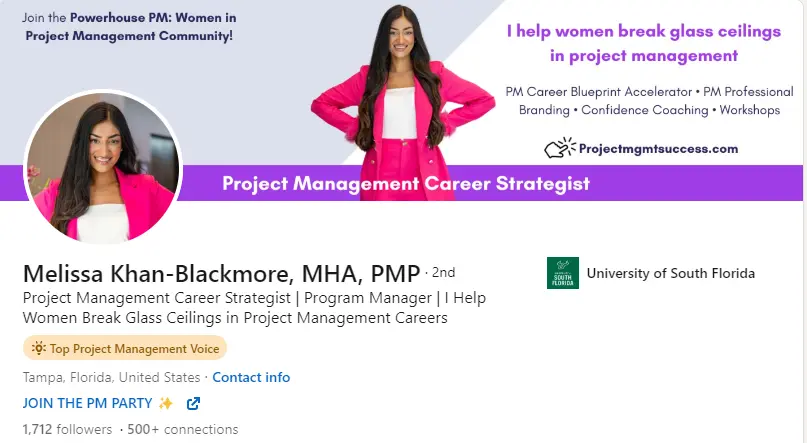
Project Management Mentorship & Career Growth: Advice from Melissa Khan-Blackmore
Melissa Khan-Blackmore is an expert at mentoring other project managers, especially those who are looking for career growth strategies. She holds the distinction of being the most followed project manager content creator on TikTok, and is one of the project manager influencers that we love to learn from online.
If you recently started your career in project management or feel like you have plateaued in your career and want to get to the next level, watch the interview below from our On the Roadmap podcast.
We also summarized some of the interview’s main points in this post where Melissa covers:
- Pragmatic advice for project managers seeking career growth
- How to find the right type of mentorship relationship
- The strategic way to advocate for yourself at work

Melissa provides a lot of gems in this 20-minute interview. Watch it below to get actionable tips and inspiration to elevate your project management career.
Visor is the modern and beautiful project portfolio tool. Visor integrates with apps like Jira and Asana, and offers templates for everything from product backlogs to templates to agile Gantt charts. Get started for free!
Project Management Mentorship & Career Growth: Full Interview
Visor CEO and founder Michael “Yaro” Yaroshefsky interviews expert voices in project management for our podcast, “On The Roadmap.”
This week, Mike brought on project management trainer, expert, and coach Melissa Khan-Blackmore. Check out the full interview below and subscribe to our channel on YouTube to get alerts about future episodes.
Melissa’s Human-Centered Approach to Project Management
Before Mike dives into specific tips that Melissa has for our audience, he asks Melissa for some hard-won wisdom that she has gained by successfully leading projects.
Melissa highlights that she values people and emotions over valuing processing.
She highlights that while project management is typically process-driven, people’s emotions “also should take precedence.”
She’s had a lot of experience working through really challenging projects, where the emotions on her team and amongst stakeholders can run how.
When she finds herself needing to get a project back on track, she points out that being only focused on tasks and processes misses a critical component of projects: the human element.
“Sometimes just talking to the person will solve the issue, and you’ll get more information out of them than maybe you would from processes,” Melissa notes.
This advice is similar to the project recovery plan tips we got from expert Michele Badie and the project management leadership advice that Susanne Madsen offered. The experts we’ve brought on our podcast agree that effective communication is at the heart of successful projects and career advancement.
Project Management Mentorship: How to Get a Mentor
Melissa points out two types of mentor relationships: those who are doing so out of the kindness of their hearts and paid mentors (often also called coaches). She has had both but started with unpaid mentors that she sought out.
“People want an easy answer: ‘Here are the five steps to get mentorship.’ But it doesn’t really work like that.” – Melissa Khan-Blackmore
When seeking people who are older, wiser, or have experience that you find impressive, Melissa emphasizes that you must have an open mind. She suggests seeking people who have great information. If there are no people like that at your company or your network, join a networking group.
Once you find someone you’d learn much from, Melissa recommends easing into the (potential) mentorship relationship by casually asking them to get coffee. See an example below of how Melissa has approached past (potential) mentors.
“I love the way you explain that. I feel like I could learn a lot from you. I’d love to meet for a coffee once a month and learn more from you.” – Melissa Khan-Blackmore on how she’s approached mentors
Melissa took this exact approach to a friend of her husband’s mother. “I was always really impressed by her. I’d go out of my way to her when I’d see her at events. Melissa stated that her “willingness to be humble” and seek out advice when seeing this woman at social events made forming a mentorship relationship feel natural.
Melissa also successfully approached a COO at a previous company where she worked. While still working there, she said that she “humbled myself.” She got this mentor by being a great listener and willing to say things like, “I’m not great at this thing, but you do it really well. How do you approach that?”
Melissa suggests that you put the time into seeking potential mentors out by asking them questions in an organic way. You also want to see if you jive with them.
“If you spot someone and think you want them to be your mentor, just test the waters. See if it feels like a good fit for you, too. Try to build a relationship.” – Melissa Khan-Blackmore
Project Management Career Growth Tips: How to Get Recognized at Work
Melissa has advanced in her career and has had notable promotions and leaps in her career because she is comfortable taking credit for her work. “Be visible. Advocate for yourself. But you have to do that strategically,” Melissa implores.
Project managers don’t want to take credit for their team’s work. That won’t sit well with your team or make you look like a leader at work. Therefore, being strategic is crucial when communicating what you have accomplished.
Melissa’s rule is to “give credit [to team members] in meetings and group chats. But when you’re meeting with your leadership, give yourself pats on the back for the things you did really well. The risks you mitigated. Put those plugs in when speaking with them after giving strategic updates.”
An example of how a project manager can communicate that they did a great job to leadership (without sounding too self-promotional) is to treat the kudos like a piece of information and an update. “We had this problem last week; it’s solved now. I spent five hours working on a plan, and it went really well. I wanted to tell you about that.”
Project managers need to get comfortable saying things like “this problem could have happened, but it didn’t” to leaders. By sandwiching this type of information or talking about a win into a status update, you’re also giving leadership the type of updates they expect and need to hear. “It’s part of the updates I give them in a weekly meeting or monthly planning. Plug it into that.”
Conclusion: Find Mentors and Advocate for Yourself (Strategically)
Ultimately, Melissa credits much of her career’s trajectory to the people she intentionally chose to learn from and her willingness to advocate for herself.
Her human-centered approach to project management ensured she never appeared self-serving or self-promotional when letting leadership know her contributions. In addition, her willingness to “be humble” facilitated fruitful mentorship relationships that made her more effective at her job.
Melissa suggests that project managers wanting to grow in their careers seek out mentors in an organic way. Find people you want to learn from and simply ask them for coffee before you ask them to “officially” be your mentor.
Furthermore, Melissa also emphasizes the importance of being strategic when giving updates to company leaders that showcase your contributions. There is a way to highlight your hard work, accomplishments, and impact within the context of giving an update, status report, or other information your leadership team needs to hear.





